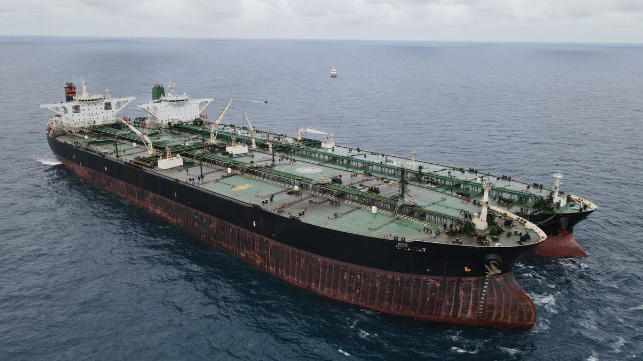Iranian VLCC Busted for STS Transfer Off Indonesia

Indonesian maritime authorities have detained an Iranian tanker and a Chinese-operated VLCC for conducting an ship-to-ship transfer in a prohibited area. The two vessels were operating dark without AIS, and they did not respond to radio calls, according Indonesia's coast guard.
While under way on a patrol off Pontianak, Kalimantan on Sunday morning, the Indonesian Coast Guard cutter KN Marore-322 picked up a radar contact with no associated AIS signal about 20 nm to the east of Penjantan Island. At about 0530 hours, commanding officer Lt. Col. Yuli Eko Prihartanto ordered the cutter to move closer and investigate.
At about 0600 hours, Marore-322 spotted two merchant tankers carrying out a ship-to-ship transfer, with cloth or net hung out over the vessel's names to obscure their identities.
An initial inspection revealed that the two tankers were the Iranian-flagged VLCC Horse and the Panamanian-flagged, Chinese-operated VLCC Freya.
Indonesian officials allege that the tankers violated regulations by anchoring outside of a designated zone; carrying out an illegal ship-to-ship fuel transfer; not displaying their flag states; turning off AIS; and (for the Freya) allegedly spilling oil.
Both tankers were escorted to Batam for further investigation.
Freya's AIS signal was last received by a commercial satellite service on January 2, when she was located near the north end of the Singapore Strait, according to data provided by Pole Star.

that matters most
Get the latest maritime news delivered to your inbox daily.
Horse is well-known for her role in Iran's efforts to bypass U.S. sanctions. She sailed for Venezuela last September with two million barrels of Iranian condensate - a critical ingredient for Venezuela's struggling petroleum sector - and returned to Iran with a load of heavy Venezuelan crude. Both voyages violated American sanctions on trade with both the Iranian and Venezuelan energy industries.
Transacting with an Iranian-flagged tanker could expose the Freya to sanctions risk. Since the reimposition of sanctions on Iran in 2018, the U.S. Treasury Department's Office of Foreign Asset Control has shown interest in blacklisting vessels engaged in prohibited trades; the case of the Freya may prove an early test of the Biden administration's sanctions enforcement plans.
